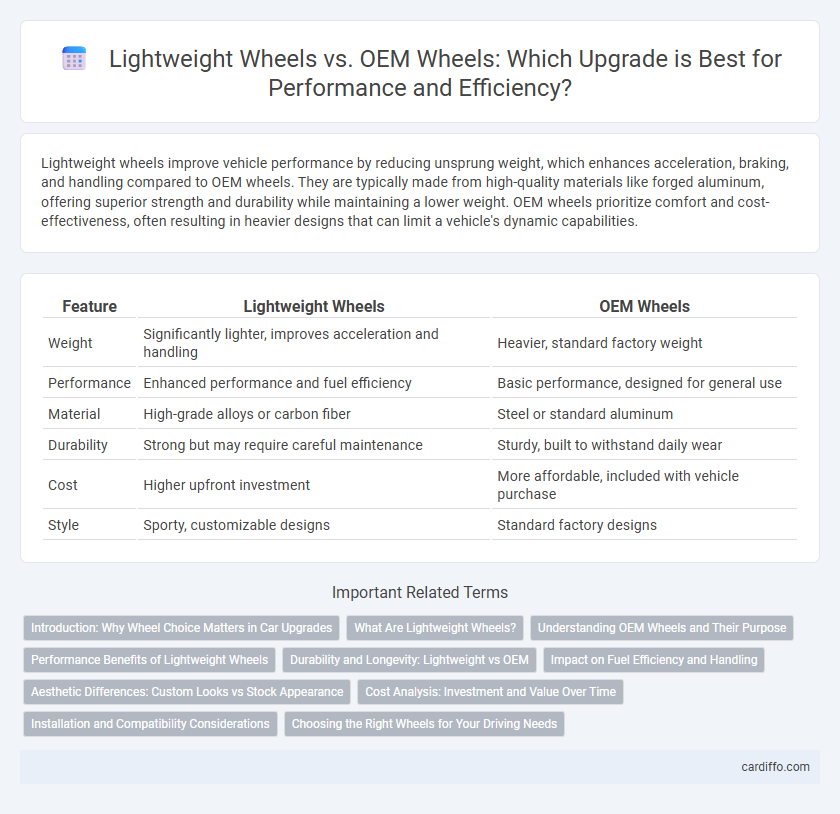Lightweight wheels improve vehicle performance by reducing unsprung weight, which enhances acceleration, braking, and handling compared to OEM wheels. They are typically made from high-quality materials like forged aluminum, offering superior strength and durability while maintaining a lower weight. OEM wheels prioritize comfort and cost-effectiveness, often resulting in heavier designs that can limit a vehicle's dynamic capabilities.
Table of Comparison
| Feature | Lightweight Wheels | OEM Wheels |
|---|---|---|
| Weight | Significantly lighter, improves acceleration and handling | Heavier, standard factory weight |
| Performance | Enhanced performance and fuel efficiency | Basic performance, designed for general use |
| Material | High-grade alloys or carbon fiber | Steel or standard aluminum |
| Durability | Strong but may require careful maintenance | Sturdy, built to withstand daily wear |
| Cost | Higher upfront investment | More affordable, included with vehicle purchase |
| Style | Sporty, customizable designs | Standard factory designs |
Introduction: Why Wheel Choice Matters in Car Upgrades
Choosing lightweight wheels over OEM wheels significantly enhances vehicle performance by reducing unsprung weight, which improves acceleration, braking, and handling. Lightweight wheels contribute to better fuel efficiency and reduced strain on suspension components, offering a more responsive and agile driving experience. Selecting the right wheels plays a crucial role in maximizing the benefits of any car upgrade.
What Are Lightweight Wheels?
Lightweight wheels are specially designed alloy wheels that reduce the overall weight of a vehicle compared to traditional OEM wheels, enhancing performance and fuel efficiency. Constructed from materials like aluminum or magnesium, they offer superior strength-to-weight ratios that improve acceleration, braking, and handling. This reduction in unsprung weight contributes to a smoother ride and increased responsiveness, making them a popular upgrade for enthusiasts seeking optimal driving dynamics.
Understanding OEM Wheels and Their Purpose
OEM wheels are designed by vehicle manufacturers to meet specific standards for safety, performance, and durability, optimized for the original vehicle model. They offer a balance of comfort, reliability, and cost-effectiveness while ensuring compatibility with the car's suspension and braking systems. Understanding OEM wheels helps in assessing the advantages and limitations before considering lightweight aftermarket upgrades.
Performance Benefits of Lightweight Wheels
Lightweight wheels significantly enhance vehicle performance by reducing unsprung weight, which improves acceleration, braking, and handling responsiveness. Their lower rotational inertia allows the engine to exert less effort, resulting in better fuel efficiency and quicker throttle response. Compared to OEM wheels, lightweight options also contribute to reduced strain on suspension components, increasing overall driving dynamics and component longevity.
Durability and Longevity: Lightweight vs OEM
Lightweight wheels often use advanced materials like forged aluminum or carbon fiber, enhancing durability by resisting corrosion and fatigue better than many OEM steel or cast aluminum wheels. OEM wheels prioritize cost-effectiveness and mass production, resulting in adequate longevity but generally shorter lifespan under extreme driving conditions compared to lightweight counterparts. Choosing lightweight wheels can extend wheel performance life due to superior material strength and resistance to wear.
Impact on Fuel Efficiency and Handling
Lightweight wheels reduce rotational mass, leading to improved fuel efficiency by requiring less energy to accelerate and maintain speed. These wheels enhance handling responsiveness and agility due to decreased unsprung weight, offering better cornering and braking performance compared to standard OEM wheels. Choosing lightweight wheels optimizes vehicle dynamics and contributes to overall cost savings on fuel over time.
Aesthetic Differences: Custom Looks vs Stock Appearance
Lightweight wheels offer a range of custom designs, finishes, and colors that significantly enhance a vehicle's aesthetic appeal compared to OEM wheels. OEM wheels typically feature standard, factory-approved styles that prioritize uniformity and brand consistency over unique visual impact. Custom lightweight wheels allow car enthusiasts to achieve a personalized look that stands out on the road, whereas OEM wheels maintain the stock appearance intended by the manufacturer.
Cost Analysis: Investment and Value Over Time
Lightweight wheels typically have a higher upfront cost compared to OEM wheels due to advanced materials and manufacturing processes but offer long-term value through improved vehicle performance and fuel efficiency. OEM wheels, while more affordable initially, may incur higher maintenance costs and provide less benefit in terms of handling and acceleration over time. Evaluating total cost of ownership highlights that investing in lightweight wheels can result in savings and enhanced driving experience despite the initial price premium.
Installation and Compatibility Considerations
Lightweight wheels require precise fitment to maintain vehicle safety and performance, often necessitating specific hub adapters or spacers for proper installation. OEM wheels are designed for seamless compatibility with factory suspension components and braking systems, minimizing the need for modifications during installation. Choosing lightweight wheels demands careful verification of bolt pattern, offset, and center bore to ensure compatibility and avoid issues such as improper alignment or increased wear.
Choosing the Right Wheels for Your Driving Needs
Lightweight wheels enhance vehicle performance by reducing unsprung weight, improving acceleration, braking, and handling, making them ideal for spirited driving or track use. OEM wheels offer durability and a perfect fit, ensuring reliability for daily commuting and long-term use. Selecting the right wheels depends on your driving style, road conditions, and performance goals to balance efficiency, comfort, and safety.
Lightweight Wheels vs OEM Wheels Infographic

 cardiffo.com
cardiffo.com